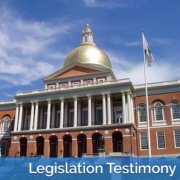TAM Testimony – Use of Alternative Fuel Heavy Duty and Medium Duty Vehicles
On June 1, Kevin Weeks, the executive director of the Trucking Association of Massachusetts, submitted written testimony in support of House Bill 2388, An Act Relative to Encourage the Use of Alternative Fuel Heavy Duty and Medium Duty Vehicles. The testimony is provided below, and a PDF is available for download.
For additional information, contact the Trucking Association of Massachusetts.
Honorable Mark Cusack, House Chairman
Honorable Adam Hinds, Senate Chairman
Joint Committee on Revenue
State House, Room 34
Boston, Massachusetts 02133
Dear Chairman Cusack, Chairman Hinds, and Members of the Committee:
On behalf of the over 250 member companies of the Trucking Association of Massachusetts (TAM), I am writing in strong support of House Bill 2388, An Act Relative to Encourage the Use of Alternative Fuel Heavy Duty and Medium Duty Vehicles. The enactment of this legislation would incentivize the transportation industry of Massachusetts to continue its long term emissions reduction through the use of green technologies in its day-to-day operations.
As you may know, this legislation seeks to provide tax credits under Mass. Gen. Laws ch. 62, § 6 for the purchase of medium and heavy duty commercial vehicles that use alternative fuels, by Massachusetts Companies. “Alternative fuel” is defined in the proposed legislation as electricity, liquid petroleum gas, natural gas, or hydrogen fuels. These credits are applicable up to $250,000 per fiscal year per company with a tax credit of $20,000 for the purchase of heavy duty vehicles, and $12,000 for the purchase of medium duty vehicles. According to the United States Dept. of Energy, numerous states already offer these types of incentives. (http://www.afdc.energy.gov/laws/)
The incentive structures of this bill will produce significant returns for both the industry and the Commonwealth. By providing a $20,000 tax credit for the purchase of an alternative fuel heavy-duty vehicle, and a credit of $12,000 for the purchase of an alternative fuel medium-duty vehicle, these vehicles will be purchased more frequently by Massachusetts companies. This will result in a more modern transportation fleet, continuing to make the State’s transportation sector more environmentally friendly and as fuel efficient as possible.
As alternative fuel vehicles replace existing vehicles, a further reduction in CO2 and NOx emissions will occur due to the increased number of alternative fuel vehicles on the road. While the current use of ultra-low sulfur diesel (ULSD) and 2010 EPA compliant engines have reduced emissions in vehicles significantly, this legislation will ensure that the progress we have seen over the last decade in emissions reduction continues in a positive direction. As well as reducing the amount of greenhouse gas emissions, the adoption of these technologies will result in the reduction of fuel consumption as well. Through the use of these fuel sources, companies can reduce operating costs and overall shipping costs, bringing increased profit to Massachusetts companies while reducing costs to those who rely on these companies’ services.
There exists ancillary benefits from this legislation as well. By making it more affordable to purchase vehicles that utilize alternative fuels, there will be an increased demand for vehicles and fuels of these types.
As a result of this increased demand, Massachusetts providers of alternative fuels and such vehicles will see an increase in revenue. These are industries that are necessary for the continuation of green energy initiatives in the Commonwealth, thereby allowing the State to organically promote business for these companies in the future. Further, the existing infrastructure to provide fuel for these types of alternative fuel vehicles is new and growing. The passage of this legislation would bring added industry interest to this type of infrastructure development, while this is by no means the only step necessary for the development of infrastructure of this nature, it lays the groundwork for future development.
Finally, by enacting this legislation, the Legislature will reaffirm its support for the transportation industry’s environmental initiatives. TAM, which has supported tough idling laws, auxiliary power unit weight exemptions and cogent transportation rules to reduce delays, views this legislation as an opportunity to continue this successful partnership. A partnership that has reduced overall emissions and increased the effectiveness of the Commonwealth’s transportation industry.
This legislation is a reasonable method of continuing the reduction of the Commonwealth’s carbon footprint while aiding state businesses and consumers. On behalf of the over 250 member companies of the Trucking Association of Massachusetts, I appreciate your consideration of this important matter. If you have any questions or concerns, please do not hesitate to contact me.
Sincerely,
Kevin Weeks
Executive Director



